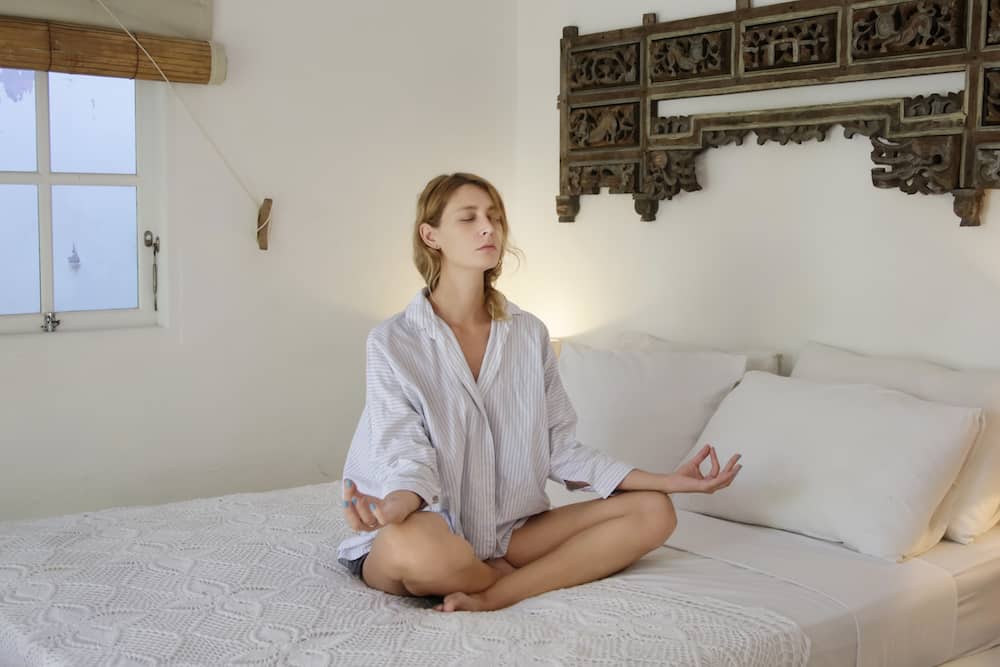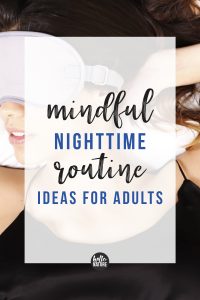Need help figuring out the answer to “what do you do before you go to sleep so you can calm your mind and drift off to sleep?” These mindful ideas for a relaxing bedtime routine for adults will help you.

How can I quiet my mind before bed?
It’s a question I used to ask myself daily.
For years, I’d stay up later than I wanted to so I could accomplish one thing: falling asleep quickly. By staying up well past midnight, knowing I would be getting up before dawn, nearly guaranteed I would fall asleep almost as soon as I hit the pillow. But I paid a price.
I operated in a sleep-deprived mode for so long that I hardly noticed it though. The moodiness, the inability to focus, the overeating – it was all there. I put on the pounds and found work, along with most parts of my personal life, unsatisfying.
For me, it started when my depression and anxiety went unmanaged. I didn’t look hard enough at my mental state to see where the problems stemmed from. I had too much on my mind during the day, did little in terms of self-care, and by the end of the day, my mind raged war on itself.
What did I do today?
What didn’t I do today?
What do I need to do tomorrow?
What do I need to three Saturdays from now?
Remember that one time when I did that one thing that I’m sure no one else remembers, but I still feel like a total idiot for?
All of these questions paved the way to an onslaught of thoughts that kept me up at night even if I did feel sleepy. It was impossible to clear my head before bed because I spent so much time in it all day and all night.
But when I became pregnant, I knew I couldn’t afford that cycle any longer. I worked hard to make sure my pregnancy was as stress-free as possible and the habits stuck.
I started doing a lot of mindfulness activities throughout the day. Then I added on mindful activities before bed. It encouraged me to create a mindful bedtime routine that would help me relax and helped me feel rested most days in the week.
If this sounds similar to anything you’ve experienced when it comes to trying to fall asleep, I hope these mindful ideas for a good bedtime routine for adults help you see that there’s another option!

Table of Contents
Relaxing Bedtime Routine Ideas for Adults
Bedtime Meditation
Meditating first thing in the morning helps us start the day off on the right foot. It calms our mind and helps us tackle whatever tasks are ahead of us that day. Morning meditation is also fairly easy because we haven’t had the chance to get too bogged down in our thoughts.
But as our day progresses, more and more issues arise. More unwanted thoughts creep in and our picture perfect day doesn’t pan out like we’d hoped. This is when meditation is more helpful for us Dealing with the frustration, disappointment, and uncertainty is necessary for us to achieve a calm mind before bed.
This is where nighttime meditation comes in. By meditating before bed, we can work through all of our issues before our head hits the pillow. We can reasonably assess how bad our day was (or wasn’t) without falling down our rabbit hole of emotions. We can also come up with plans to improve the day’s shortcomings and clear our mind of whatever issues we feel need solved before bedtime.
This helps eliminate many of our racing thoughts before bed and allows us to focus instead on breathing exercises or simply drifting off to sleep.
Bedtime Meditation Tip:
I use the Calm app for all meditations, but I especially appreciate it for nighttime meditation. Not only do they have sleep meditations, but they also have sleep stories. Our preschooler uses these at night (they have kid specific ones as well as adult ones), but it’s very relaxing to listen to a nighttime story. Sometimes I use them in place of meditation and sometimes I use them in addition to.

Breathing Exercises for Sleep
For the longest time, I paid little to no attention to my breathing. Who has time for that, I wondered. And even more so, don’t you just breathe in and breathe out?
After listening to some guided meditations that focused heavily on breathing exercises, I quickly saw the error of my ways. How you breathe can very much so affect how you feel and how you respond to stress. By controlling your breathing, you’re also controlling your heart rate. So as your breathing slows, your heart rate will follow and then your body starts to relax a bit more.
While there are tons of different breathing exercises, here’s a simple one that can be done anywhere:
- Slowly breathe in as deeply as you can through your nose
- Slowly breathe out all the air you can through your mouth
- Repeat until you’re calmer and/or more relaxed
If you want to add to this mindfulness activity, count each breath or think in/out in your mind as you breathe. It helps shift the focus off of whatever you’re stressed about onto your breathing instead.
Breathing exercises are a great way to deal with stressors as they pop-up throughout the day, but they’re also good for quieting the mind before bed. It’s a similar idea to counting sheep.
Bedtime Breathing Exercise Tip:
If you struggle to calm your mind before bed enough to complete these breathing exercises, follow a guided meditation, sleep meditation, or a body scan meditation (Calm has all of these as well.) Many of these focus on breathing exercises that can be done while meditating.
Not only will these help give you something else to focus on, they’ll also help keep you in the right mindset. Relaxing, meditating, or practicing your breathing before bed to help you calm your mind and body can be tough. You might feel like you’re failing or you’re just not meant to do it. Guided meditations help you see that it’s about the journey and the goal is not to clear your mind. It’s about helping you appropriately handle whatever pops into your head.

Ditch The Technology Before Bed
I’ve talked about the importance of a digital detox before, but unplugging before bed can be even more important.
Not only does technology impact our sleep quality, it also can prevent us from being as mindful. By watching tv, playing games, or scrolling through social media feeds before we’re falling asleep, we’re risking a few things.
- We may be reminded of something through an external source (tv show, Facebook post, Instagram photo, etc) that causes unnecessary stress right before bed. Now we’re back to the racing mind or potentially upset about something else and struggling to go to sleep.
- We’re also taking up valuable time that could be spent on mindfulness activities such as meditating or breathing exercises. These activities are ones that will actually help us sleep rather than hindering it.
No Technology Before Bed Tip:
If you’re using an app for meditating or breathing exercises, try to do it a least 30 minutes before you sleep. If you prefer to meditate right before you go to bed, try to limit your interaction with your phone during and after your meditation or ditch the app entirely and meditate without it.

Read a Physical Book Before Going to Sleep
If you like to do something before drifting off to sleep, try reading a physical book. Our brains process information different when reading a physical book vs an e-reader. If you’re hoping to retain more information and not stay up any later than necessary, physical books are your best bet.
Reading Before Bed Tip:
If you find having the light on in your room before bed too stimulating, consider reading in a different room. Read until you’re tired or for a certain amount of time then head to bed in a dimly lit or dark room.

Go to Bed Around the Same Time
Going to bed at the same time every night and waking up at the same time every day helps your internal clock regulate itself. This in turn can help you fall asleep faster as your body is already programmed to sleep at a specific time.
If you do have to throw off your sleep schedule, try to keep it to within an hour or so whether it’s when you wake up or go to bed. Then resume your regular sleep schedule as quickly as possible.
Sleep Routine Tip:
Avoid the snooze button and try to keep your schedule the same even on the weekend. If you’re getting up early for work on the weekdays and have off on the weekends, use that time to do something relaxing. Catch up on your favorite show, go out for a morning hike, or prepare a nice breakfast. The goal here is to just make sure you keep getting up at the same time and following the same bedtime.

Write It Down Before Bed
One of the top before sleep habits I’ve developed that’s helped me tremendously when I’m stressed it doing a brain dump of sorts. Sometimes it’s journaling, sometimes it’s planning my to-do list for the week, sometimes it’s creating a gratitude list, and sometimes it’s all of the above.
Regardless of what it is, it empties my mind and allows me to better focus on being calm. Doing this before bed is especially helpful as I don’t have a running list of things I’m trying to remember for the next day then.
There are a few ways to do this mindful activity.
- Gratitude lists: write down anything you’re grateful for from the day. If it’s hard to come up with something, it’s even more important to find even one thing to be the bright spot from the day – big or small.
- Brain dump: write down anything that comes to mind. It doesn’t matter if it’s related to anything or completely random. The whole point is to get it out of your head.
- To-do list: write down your to-do list for the next day or even the upcoming week.
- Journal: whether you’re using prompts or not, journaling is a mindfulness activity that can help you work through a lot of things. If you’re struggling to figure out what to write in your journal at night, consider asking yourself the following questions as prompts:
- What good things happened today?
- What could I have done better today?
- What word or phrase describes today?
- What did I accomplish today?
- What is something I learned today?
Writing Before Bed Tip:
The goal of this isn’t to stress you out more. It’s to get everything out of your head so you can clear your mind enough before bed. Don’t stress about picking what option you choose to write about. Write whatever you feel at night, knowing you can change it tomorrow or even half way through your writing time.

Why should we find a bedtime routine for adults?
Bedtime routines or nighttime rituals help train our body and mind. We start to realize it’s time to unwind without even thinking about it by having a regular routine. Bedtime rituals also help us pursue less stimulating activities right before bed. Both of these help us fall asleep quicker and get more good sleep so we wake up feeling well-rested in the morning.
How long should my bedtime routine be?
The more time you have, the better. But I know life makes it hard to devote hours to a relaxing nighttime routine. 15-30 minutes should be enough, but you may need more or less time. My recommendation is to figure out what activities you want to do before bed and work backwards from there.
If you want to meditate, write, and then read, how much time do you need for each to feel calm before trying to go to bed? You’ll most likely need more time for that versus just practicing your breathing exercises before bed.
The key here isn’t how long your bedtime routine is or even what exactly your night rituals are. The goal is to make the hour or hours before bedtime as relaxing and mindful as possible to help improve your quality of sleep.

I hope these mindful ideas for a relaxing bedtime routine for adults help you figure out a solid evening routine that works for you. It may take time to practice these ideas or even to figure out what works best for you. Once you’ve established your bedtime rituals though, my hope is that you’ll notice a distinct difference in your sleep, attitude, and overall wellbeing – especially in the morning.
Don’t forget these ideas for a relaxing bedtime routine for adults! Pin them to your favorite Pinterest board for later.


You might also like:

